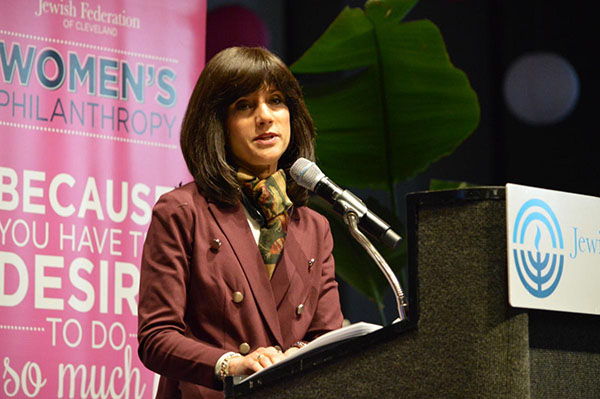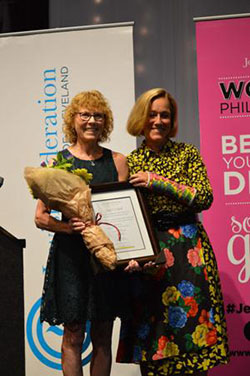06/07/2019
Women's Philanthropy Spring Brunch Welcomes First Female Chasidic Judge in US
- Share This Story

Judge Rachel “Ruchie” Freier discusses her journey from lawyer to becoming the first female Chasidic judge. CJN Photo / Alyssa Schmitt
Article reprinted with permission from Cleveland Jewish News.
ALYSSA SCHMITT | STAFF REPORTER
When Rachel “Ruchie” Freier was approaching 30 years old, she was done being a legal secretary. During a get-together before Passover that year, she announced to her friends she was going to college and would become a lawyer.
She still she wanted to cook dinner every night and continue her other roles in her Chasidic home in Borough Park of Brooklyn, N.Y., meaning she would need six years to finish college on a part-time basis and four years to complete law school.

Judith Wolkoff, left, is presented with the Irene Zehman Volunteer Award by Charna E. Sherman. CJN photo / Alyssa Schmitt
“My friends said, ‘Ruchie, 10 years, we’re going to be 40 then,’” said Freier at the Jewish Federation of Cleveland Women’s Philanthropy’s Spring Brunch June 2. “Guess what happened? Ten years later, we all turned 40 and I was a lawyer.”
Freier’s path to become a lawyer, and later the first Chasidic woman elected to public office, was brimming with naysayers at each turn. In law school, they said she wouldn’t be able to pass the bar. When she ran for Brooklyn civil court judge, no one would endorse her at first, she said.
Yet in 2016, she was elected a Civil Court judge of the Kings County 5th Judicial District in New York, which encompasses Borough Park. Through it all, she said she navigated her journey in law without compromising the standards of her Chasidic community.
“Don’t think for one second that you have to compromise those standards to succeed in the outside world,” she said. “We’re all different and we all have different standards that connect us to God, and regardless of what your standards are in Judaism – and we’re all different – but when you stick to your standards and don’t compromise them, the world will respect you.”
Nearly 400 people gathered at Landerhaven in Mayfield Heights for the brunch where Freier was the featured speaker and Judith Wolkoff was honored with the Irene Zehman Award for her work at the Transplant House of Cleveland. Since April 2015, Wolkoff has volunteered at the Transplant House, bringing home-baked bread, preparing rooms for new guests, helping with patients’ laundry and assisting families with shopping.
When accepting the award, Wolkoff said the Transplant House “goes to the core of my heart.”
During Freier’s talk, she discussed being raised in a modest Chasidic home and said her parents instilled in her the idea that she would have to work hard in life. Even growing up in a religious home, she felt the world was wide open with opportunities.
“I never felt constricted, I never felt constrained, I never felt there was something I wanted to do but I couldn’t do,” she said.
During her campaign, Freier, 54, stuck to her standards. In Borough Park, a woman’s photo cannot hang in the street, so her campaign signs said “Vote for Rachel Freier,” without a photo of herself. When talking with people, she didn’t shake hands with men.
“I followed every single one of those rules,” she said.
The idea to run for office came when the judge who previously held that seat, who was also Freier’s uncle, said he would retire. He told Freier if she had any desire to be a judge, that seat would be her only chance to achieve it. Before she made a decision, she wanted to see how her family would react.
“You want to be a judge?” her husband, David Freier, had asked. “We’ll get good health insurance. It’s a good idea.”
Her husband, three sons and three daughters supported her through the campaign. Her sons put up campaign signs in men’s bathrooms and created a Yiddish jingle that played through the streets. Her husband went to the rabbis and earned their endorsements. Freier has been called a trailblazer for her accomplishments and was deemed the “Hasidic Superwoman of Night Court” by The New York Times. Yet, she said her husband is the real trailblazer in the story.
“He’s the first Chasid who not only supported his wife to run for public office and financed my campaign, but he ran around to rabbis getting their endorsement, he ran around getting signatures. He didn’t stop until I won,” she said.
After being sworn in as judge, Freier was asked by multiple news organizations for interviews. In one interview, the reporter wore a dress that did not follow her Chasidic community’s standards on modesty. The video went viral through her neighborhood and Freier felt responsible that men in the community were subjected to it.
At that point, she was done with interviews. Then, a request came from the “Megyn Kelly Today” show on NBC. To ensure there was not a repeat of the previous interview, Freier asked the producer if Kelly could dress modestly when Freier was on the show, and Kelly did.
“I shouldn’t be the cause of my fellow Chasid seeing a woman not dressed appropriately according to our standards,” Freier said. “My friends, all you have to do sometimes is just share your standards and your needs and your concerns with your fellow people, and you’ll be surprised what you may get – their respect.”
Freier’s dedication to such standards was tested well before she ran for judge. While in law school and working as an intern, Freier was bothered by words thrown around that violated Shmirat HaLashon, the purity of speech.
“In Borough Park we call them curses,” she said.
Freier was taught as a child in school that if one does nothing when something bothers them, then they can become accustomed to it and possibly join in later. She knew she had to address the issue before she reached that stage and approached the litigator who was the main source using curse words. She explained the situation and before she could finish, the litigator announced to the office everyone had to watch their language around Freier. The sentiment soon turned sour, as it was often repeated when Freier entered a room.
“I have to outsmart these guys,” she said. “I have to create a disincentive of them cursing.”
She put a charity box on her desk and told the office that for each curse word, the offender would have to put a quarter in the box. The first donation was a $10 bill.
“You don’t know what potential you have,” she said in closing. “You may have people telling you, ‘it’s impossible’ – naysayers all the way – of things you want to accomplish. ... All you have to do is try, just stretch out your arm and God will do the rest.”


Comments